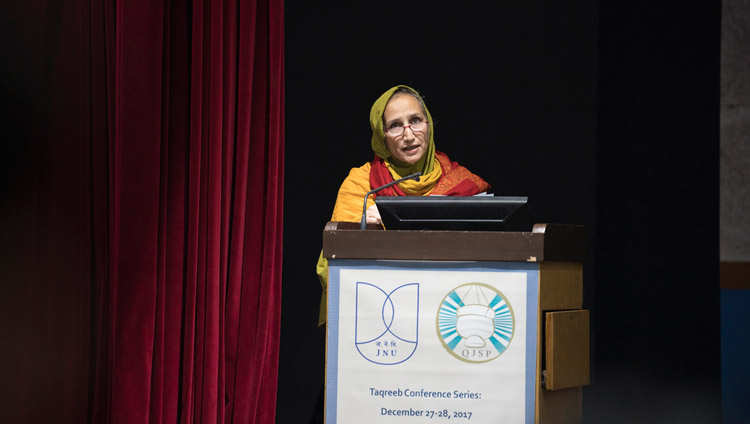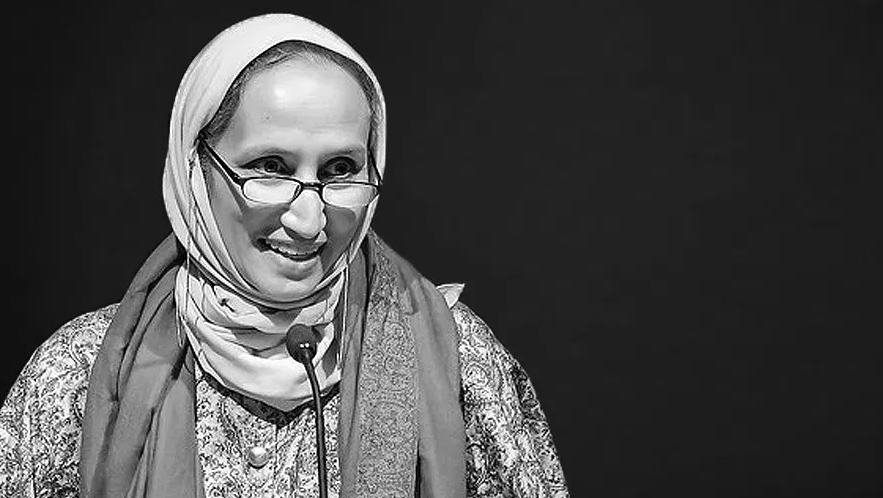Dr Tahera Qutbuddin becomes 1st Indian to be honored with Nobel Prize of the Arab World - Sheikh Zayed Book Award
Interview with Dr Tahera Qutbuddin
Dr Tahera Qutbuddin of Mumbai, and currently residing in the United States of America, became the first Indian to be conferred with the Sheikh Zayed Book Award, in its 15th edition. The Sheikh Zayed Book Award is considered to be the Nobel Prize of the Arab world. She was given this honor for her work "Arabic Oration - Art and Function". We bring to you an interaction with Dr Tahera Qutbuddin, where she elaborates on her close albeit remote association with India and Mumbai, her interaction with Arabic literature and potrayal of India in Arabic literature, among other things.
What Tahera says about winning the award:
TQ: I am delighted and honored to have been selected for the Sheikh Zayed Award for my recent book, Arabic Oration: Art and Function, which was published by Brill Academic Publishers of Leiden in 2019.
My late father, Syedna Khuzaima Qutbuddin, who had the pleasure to meet His Eminence Sheikh Zayed many decades ago, taught me that propagating harmony between people is among the major teachings of our Prophet Muhammad, and I appreciate the sincere efforts of the UAE to build bridges of intellectual and cultural exchange between the Arabic speaking world and the rest of the globe. The award is one that I am truly pleased to be affiliated with, and it’s the first time they have awarded an Indian scholar.
Orations—the powerful, rhythmic, and vibrantly visual speeches and sermons of the Arabs and early Muslims—are among their brilliant cultural achievements, and the mother of all later Arabic prose. They are also a dynamic repository of their people’s lived lives—of their religion, politics, law, governance, theology, and social interactions. I am pleased that this award will bring these hidden gems to greater light among scholars of Arabic Literature and Islamic History in the West, the Middle East, and hopefully in India as well, and also, I hope, beyond the ivory tower among readers who are interested in exploring world cultures through the window of their people’s own words. There is so much wisdom in these 1400-year old texts that is universal, and its lessons are as fresh and applicable today as they were in the 7th century.

What she says about Mumbai and India
TQ: I was born and grew up in Mumbai. I’ve lived in Egypt and now in the United States for many decades now, and I have gained much from those places, but my roots are vital to who I am. Indian culture is part of the fabric of my being. It is the place of my childhood memories, of playing in the monsoon rains and eating mangoes in the summer. It is the place of my early education in Fort Convent, Presentation Convent in Kodaikanal, Villa Theresa, and Sophia College, where I had the joy to make friends from different communities, many of whom I’ve kept in touch with these many years. It is the place where my family and many dear members of my Bohra Muslim community reside. It is the place of the mausoleums of my father, Syedna Khuzaima Qutbuddin, my uncle Syedna Mohammed Burhanuddin, and my grandfather, Syedna Taher Saifuddin. I come back to Mumbai often, at least once a year, often even two or three times, and hope to continue to do so always. I love my Mother India, and pray for her security and progress, and for harmony and love between the many beautiful communities that call her home.
Her research focuses on intersections of the literary, the religious, and the political in classical Arabic poetry and prose. Can she throw some light on what transformations the Arabic literature has witnessed in recent times?
TQ: Arabic literature spans fifteen centuries and many continents. It all started in the Arabian Peninsula in the 7th century with the cadenced orations and powerful poetry of the semi-nomadic Arabs. This was a tree-trunk that grew many branches and gave many fruits over time. Arabic literature has always influenced other cultures—some say the translations made by 10th century scholars of ancient Greek wisdom into Arabic, which were then translated in Spain into the local Romance languages there, sparked the European Renaissance in the 14th century.
It has also been continually influenced in turn by other cultures. In the past two hundred years, the imported literary forms of the novel and free verse have taken root in the Middle East, and Arabic writers have combined these with their own heritage to produce visceral poems and sophisticated novels that give insight into their reality on the ground and their hopes and their dreams. The Nobel-prize winning Egyptian author Naguib Mahfouz is well known worldwide.
What is her opinion on the relations between India and Arabic countries? How the relations could be improved? What could be the measures. Whether exchange of literature, films will help. Whatever she feels.
TQ: The first acquaintance of the residents of the Indian subcontinent with the Arab people came about when Arab sailors first docked at Indian ports in order to acquire spices in pre-Islamic times, perhaps as far in the past as the year 50 AD. Sustained contact began in the early 8th century, when Arab Muslims settled in Sind. Arabic-speaking countries and India have had personal and cultural exchanges that go back almost two millennia, and today’s greatly mobile world, there is ever more increasing contact.
One of the most important things to improve relationships between two groups of people in my view is to understand each other’s culture, which highlights unique characteristics, but also common human goals, and a wonderful way to do this is by reading their literature.
My late father, through his educational foundation Qutbi Jubilee Scholarship Program (QJSP), endowed an institution for academic conferences to promote harmony between communities within India, and between India and people of other lands. He called this initiative “Taqreeb,” which is an Arabic/Urdu word that means “to bring closer.” Its aim is to highlight exemplars of harmony, and doctrines that promote harmony, especially within the religions and traditions of India. I am a co-director of QJSP’s Conference Initiative, and we have organized such conferences in recent years in collaboration with JNU in New Delhi and the University of Kolkata, and we hope to continue with them and with others (LINK).
I feel the Sheikh Zayed Award reaches for the same goals. My own SZBA award is itself an embodiment of these aspirations of harmonious cosmopolitan cultural exchange—an Indian-born, Gujarati-speaking woman, now teaching at a US university, awarded a book prize by the United Arab Emirates for a book published in English, in Europe, on classical Arabic literature!
How India is portrayed in Arabic literature? Her views.
TQ: India is portrayed in Arabic literature as a land of rich culture, ancient wisdom, and wondrous beauty.
Maulana Ali– who was the Prophet Muhammad’s cousin and son-in-law, the first Shia Imam, the fourth Sunni caliph, and the acclaimed sage and orator of Islam – praised India in one of his pithy sayings saying, “Indian earth is the world’s most fragrant!”
The 10th century Iraqi litterateur and judge, Tanukhi, spilled much ink on the Indian elephant which he found truly fascinating.
The 11th century polymath and mathematician from Khwarazm, Biruni, is also hailed by some as the father of Indology. His Tārīkh al-Hind (History of India) is a remarkably detailed study of Indian culture and the Hindu faith.
Ibn Battuta – a 14th century Moroccan globetrotter and author of a famous travelogue – visited Delhi and the Maldives and lived there for months. He was fascinated with the social behaviors of those communities and wrote in appreciation of their cleanliness and hospitality. Though he spoke only Arabic, and he was able to live in Delhi and function as a judge using only his Arabic to communicate.
Many of the classics of the Indian Vedic tradition were translated in India into Arabic (and Persian) during medieval times, including the Mahabharata and the Hathagoya, a work on bodily and spiritual discipline. Today, India’s national poet Rabindranath Tagore, among other major Indian thinkers, has been translated into Arabic and is read and appreciated in the Middle East.
Moreover, intriguing though it is to explore how India is portrayed in Arabic literature, it is also interesting to learn the history of Arabic literature within India, of India as a major producer of Arabic. I published an article many years ago titled “Arabic in India: A Survey and Classification of its Uses, Compared with Persian,” in which I explored the uses of Arabic in India from its arrival in the 8th century through the 20th, in terms of liturgy, teaching and study, nomenclature, inscriptions, vocabulary assimilation, composition of religio-scholarly texts, and some marginal utilitarian uses (LINK).
Arabic has had, and continues to have, a living presence in India. My own father Syedna Qutbuddin was an esteemed scholar of Arabic, as was Syedna Burhanuddin, and Syedna Taher Saifuddin before him—and as is Syedna Taher Fakhruddin today. Syedna Fakhruddin expounds 15-minute religious lectures, titled Majalis al-Hikma (Assemblies of Wisdom), online every Thursday to the community in three language: Gujarati (in the Bohra form called “Dawat-ni-zaban”), English, and Arabic. We hail from a family going back a thousand years to the Rajput rulers of the 11th century, and their viziers Raja Bharmal and Raja Tarmal, in a family tree that includes many prolific Arabic-Islamic scholars.
To join us on Facebook Click Here and Subscribe to UdaipurTimes Broadcast channels on GoogleNews | Telegram | Signal



